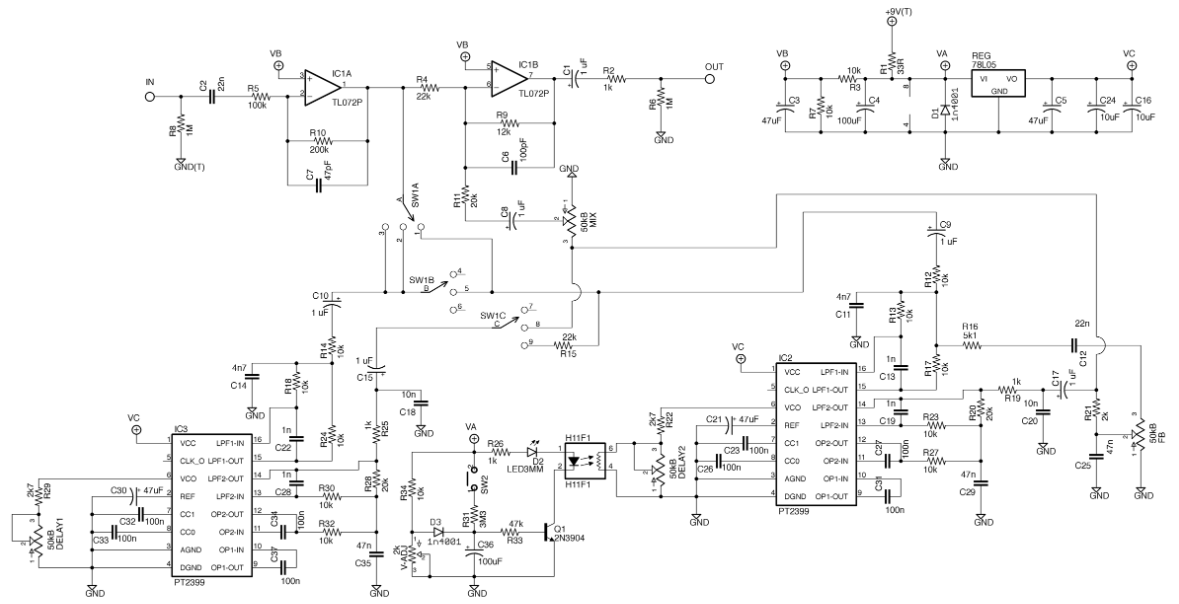Difference between revisions of "Multiplex Echo Machine"
m (→Pedal Manual) |
m (→Phase Inversion) |
||
| Line 30: | Line 30: | ||
|- | |- | ||
! Electronic Part || Action || Phase State | ! Electronic Part || Action || Phase State | ||
| + | |- | ||
| + | | Q1 || Inverts* || Unaffected - please see note | ||
|- | |- | ||
| IC1a || Does not Invert || Unaffected | | IC1a || Does not Invert || Unaffected | ||
| Line 36: | Line 38: | ||
|} | |} | ||
| − | + | {{note|Q1}} Q1 modifies the swell of the H11F1 - lengthening the delay by means of the momentary switch (the '''Tape Speed''' control). It is part of the actual signal chain and as such, while the transistor itself inverts phase, because it isn't touching the signal itself, it doesn't cause a phase inversion of the signal coming out of the pedal. | |
| + | |||
| + | As with all schematic observations, this will need to be born out by testing of the actual pedal. | ||
==Pedal Manual== | ==Pedal Manual== | ||
Revision as of 18:03, 12 February 2018
1776 Effects Multiplex Echo Machine. This is a delay pedal that appears to have been wholly designed and implemented by 1776 Effects. What makes this delay different from other delays available in the marketplace is that it enables emulation of three different magnetic tape-style echo/delays from days past:
- The Binson Echorec
- The Roland RE-201 Space Echo
- The Echoplex Ep3
This is done by using two different ICs (integrated circuits) and controlling the timing and order in which each IC has signal fed into it.
Controls
- Knob 1 - "Delay 1": Sets the delay time of the first delay - turning the knob clockwise increases the length of the delay.
- Knob 2 - "Delay 2": Sets the delay time of the second delay - turning the knob clockwise increases the length of the delay.
- Knob 3 - "Feedback": Increases / decreases the number of repeats - turning the knob clockwise increases the number of repeats.
- Knob 4 - "Mix": Adjusts the dry/wet blend. Align the knob directly in the middle to have a 50/50 dry/wet mix.
- Knob 5 (3-position switch) - "Tape Mode": Changes the way the signal is routed through the PT2399’s to simulate tape delays of the past:
- Binson Echo rec
- Roland RE-201 Space Echo
- Echoplex v. Ep3
- Footswitch 1 -"On/Off": This turns the effect on and off in the signal chain
- Footswitch 2 - "Tape Speed": Holding down the momentary footswitch slowly speeds up the delay speed. Releasing the switch slows the speed back down to the time setting of the knob. The tape speed is highly interactive depending on how you have "Delay 2" set.
General Information
http://1776effects.com/wp-content/uploads/2015/03/Multiplex-Build-Doc-1.7.pdf
Phase Inversion
From our examination of the schematic below, the Multiplex Echo Machine appears to not invert phase as compared with the signal that goes into the pedal.
| Electronic Part | Action | Phase State |
|---|---|---|
| Q1 | Inverts* | Unaffected - please see note |
| IC1a | Does not Invert | Unaffected |
| IC1b | Does not Invert | Unaffected |
Template:Note Q1 modifies the swell of the H11F1 - lengthening the delay by means of the momentary switch (the Tape Speed control). It is part of the actual signal chain and as such, while the transistor itself inverts phase, because it isn't touching the signal itself, it doesn't cause a phase inversion of the signal coming out of the pedal.
As with all schematic observations, this will need to be born out by testing of the actual pedal.
Pedal Manual
As of this time, 1776effects.com has not issued a separate manual on how to use the pedal. The best current references that we're aware of are this wiki page, or the build manual linked here to the 1776 Effects website which describes the architecture of, and how to build the pedal.
Schematic
- Additional Sources
